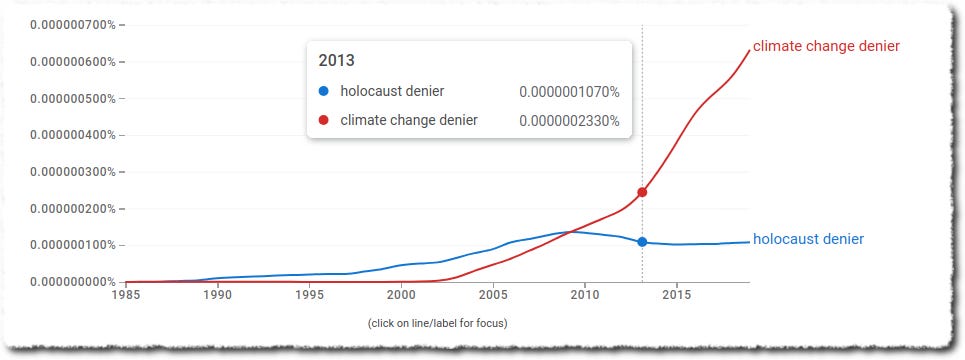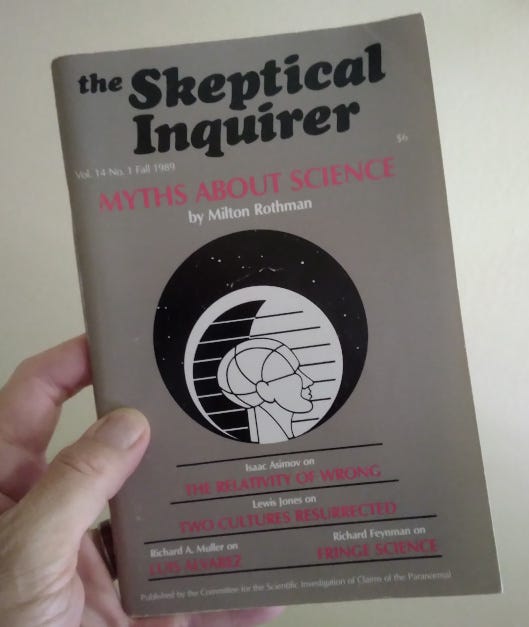"If you permit yourself to read meanings into (rather than drawing meanings out of) the evidence, you can draw any conclusion you like." - Michael Keith, "The Bar-Code Beast", The Skeptical Inquirer Vol. 12, No. 4, p. 416
I was a long-time subscriber and an even longer-time reader of The Skeptical Inquirer. The earliest edition I can pull from my bookshelf is from the Fall of 1989. Back then, in the Before Times, it was a quarterly publication and there was no World Wide Web, Facebook, or Twitter to amplify the rabble. The last issue I have is from late 2013, when I cancelled my subscription and stopped paying attention to SI. The tripwire was the shift in language SI began using to influence debates involving objective evaluations and scientific inquiries. This was most apparent in articles on the subject of what is now called "climate change."
For certain, there is no lack of crackpots intent on cherry picking bits and pieces of legitimate scientific studies in order to build a jigsaw puzzle picture of whatever it is they want. It's work dealing with people like this, but it's important to refute them on every point with shared data and a transparent trail of logic. My observation and experience has shown this to be the only reliable way to better understand my position - I virtually always learn something new - and in the long run gain confidence that I'm standing on solid ground with respect to how well I understand the world around me. The other way, attacking people who reveal my weaknesses, looked to be a good way build a lonely echo chamber glued together by bitterness and envy.
I have long been of the opinion that man is shifting the climate. Decades spent studying system dynamics and working as a professional computer engineer paid to influence the dynamics of complex systems, this conclusion seemed self-evident. I also have degrees in biochemistry and cell biology. All this is to say it's equally self-evident the the science is never settled. To claim so is to reveal oneself as unschooled and undisciplined in the ways of Science and Nature. At the very same time, man cannot be the only factor contributing to a changing climate. Failing to continually study the factors involved, acknowledging them with intellectual honesty, and addressing them from an overall systemic view, we are much more likely to implement ineffectual or even harmful policies. Indeed, I think this has happened as uninformed power-players have co-opted circumstances and useful idiots to satisfy their own ends.
But this isn't meant to be a rant about man's apocalyptic skills for mucking up his own nest. It's about something much deeper. It's about the corruption of the very tools we need to find our way through. Back to SI…
When SI started to ride the growing popularity of branding people who challenge the preferred orthodoxy by asking good questions as "climate change deniers," I figured it was time to part company. I have no idea what trajectory SI has taken in the past 10 years.

There is something both offensive and decidedly chilling about labeling someone educated and trained in the ways of science with a pejorative such as "denier." It's offensive because its purpose is to equate legitimate challenges to the preferred orthodoxy to the fetid beliefs of those who deny the holocaust perpetrated by Nazi Germany in World War II ever happened. It seeks to establish as "truth" a false equivalence between legitimate scientific inquiry and the undeniably abhorrent and willfully ignorant beliefs resident in the minds of dangerous people.
This is, of course, by design for those who throw such grenades. As with any bully, it's easy to spot their weaknesses once you learn how to look past the clumsy way they're swinging the Denier Bat. Maybe their skills for debate are weak or they lack vetted and convincing evidence or they're protecting their tribe or their status. Whatever the reason, the goal is to discredit any and all critics using Alinsky's Rule #13 - "Pick the target, freeze it, personalize it, and polarize it." Applying rules like this to scientific inquiry is how to politicize science. And politicized science is no longer science, it's just politics. (Left for another day is an epic rant devoted to academic degrees conferred for "political science.")
The insidious consequence of this behavior - what I find especially chilling - is the long-term erosion of trust in the scientific process. To call someone with demonstrated skills in the ways of science a "denier" paints them as someone who is in denial while simultaneously denying them a platform to present their case. Having been successfully labeled a "denier" results in their being effectively silenced from presenting data and arguing their case. The accusers, for a long list of subjective and self-serving reasons, have lost the will and skill to stop and ask of themselves, "What if I'm wrong?" Once upon a time, we called this "an open mind." The only reliable way to shake out the charlatans and grifters from authentic scientific knowledge is to subject everyone to the rigors of the scientific process. Anything else is wishful or magical thinking. Anything else is decidedly unscientific.
For those paying attention to this shift, where the road we've been traveling in this regard leads is depressingly predictable. The list of recent corrupt "scientific" conclusions and "discoveries" is lengthy indeed. The recent revelation that Harvard Business School professor Francesca Gino, known for researching dishonesty and unethical behavior, has herself been accused of falsifying results serves as a particularly profound example of what's at stake. It reveals the cumulative effects from years of weak scientific rigor. Self-serving ethics and a lack of intellectual honesty has taken deep roots within academia and is busy infecting future scientists.
So it's in this boiling climate of politicized science that I was pleasantly surprised to cross paths with a link to this article in a recent on-line edition of the Skeptical Inquirer:
The Ideological Subversion of Biology
The article is very close to my heart as it deals directly with the corrosive effects “progressive” politics are having on the biological sciences. It's thorough and well written. Just how I like it. What I find particularly interesting is how much the control of language is referenced in the article. To gauge the state of current scientific investigation we need only observe the reactions to this article and what happens to the authors.
I don't know just yet, but it may be time to revisit SI. Have they acknowledged their contribution to this godawful mess and begun to change their ways?
If you have any questions, need anything clarified, or have something else on your mind, please use the comments section or email me directly.




